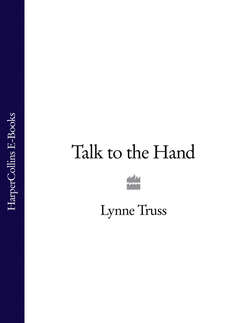Читать книгу Talk to the Hand - Lynne Truss - Страница 7
1 Was That So Hard to Say?
Оглавление“What ever happened to thank you?” we mutter. Ask anyone about the escalation of rudeness, and their first example is likely to be a quite animated description of how they allowed another car to pass last Wednesday, and received no thanks or acknowledgement; not even an infinitesimal nod accompanied by a briefly extended index finger, which is (curiously) usually good enough for most of us.
What has happened to the rituals of what Goffman called “supportive interchange”? They have gone disastrously awry, that’s what. Last year I was a passenger in another woman’s car in Denver, Colorado. Waiting at a junction, we received a wave from two young men in a car alongside. I smiled back, and then asked my companion whether the chaps might want something. She opened my window and called across, “Can I help you?” At which the driver of the other car stopped smiling and yelled, “What do you mean, can I help you? I was only being Effing friendly! Why don’t you get back to your Cherry Creek Country Club, you rich bitches!” and drove off. Of course, we were both taken aback. My companion, interestingly, was upset most by the insulting accusation of wealth. It annoyed her very much to be called a rich bitch. For my own part, however, I just kept thinking, “But surely a simple ‘No, thank you’ would have sufficed? What was wrong with ‘No, thank you’ in that situation?”
There is a theory of manners that uses the fiscal image of balancing the books, and I consider it a good one to begin with. For every good deed there is a proportionate acknowledgement which precisely repays the giver; in this world of imaginary expenditure and income, the aim is to emerge from each transaction with no one in the red. This involves quite a lot of sophisticated mental micro-calculation and fine moral balancing, so it’s small wonder that many people now find that they simply can’t be arsed. Nowadays, you open a door for somebody and instead of saying, “Thank you”, they just think, “Oh good” and go through it. This can be very annoying if you are standing there expectantly with your pen poised and your manners ledger open at the right page. All you can enter in the credit columns is flower doodles, and these in no way salve your shock and disappointment.
Why are people adhering less to the Ps and Qs? Where does that leave those of us who wince every day at the unspoken “thank you” or the unthought-of “sorry”? Is there a strategy for cancelling the debt? Should we abandon our expectations of reciprocity? And isn’t it confusing that our biggest experience of formal politeness comes from the recorded voices on automated switchboards – who patently don’t mean it? “We are sorry we cannot connect you at this time,” says the voice. But does it sound sorry? No, it doesn’t. It is just saying the politeness words in as many different combinations as it can think of. “Please hold. Thank you for holding. We are sorry you are having to hold. We are sorry to say please. Excuse us for saying sorry. We are sorry to say thank you. Sorry, please, thank you. Thank you, sorry, please.” An interesting rule applies here, I find: the more polite these messages, the more apoplectic and immoderate you become, as you lose twenty-five minutes from your life that could have been spent, more entertainingly, disinfecting the S-bend. “Thank you for choosing to wait for an adviser,” says the voice. “Choose?” you yell back. “I didn’t Effing choose this! Don’t tell me what I Effing chose!”
